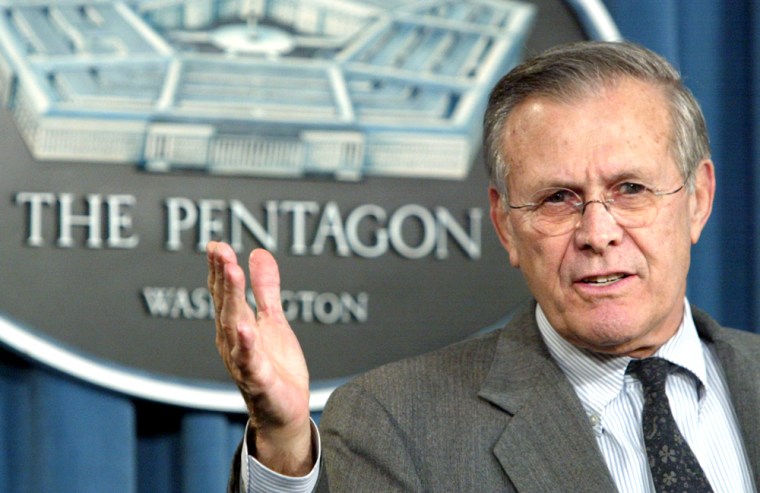Defense Secretary Donald H. Rumsfeld, whose future has been in doubt amid spreading violence and U.S. deaths in Iraq, was asked by President Bush on Friday to remain at the Pentagon in the administration’s second term, a senior official said.
Bush and Rumsfeld decided on the secretary’s future during an Oval Office meeting. Whether or not Rumsfeld would remain had been the last big question mark about Bush’s Cabinet for his second term.
Rumsfeld’s tenure has been marked by unanticipated postwar violence in Iraq and more than 1,250 U.S. deaths.
Describing Bush’s decision, the administration official said the president believed Rumsfeld was “the right person at this moment in our history in fighting the war on terror to lead our armed forces.”
The secretary’s future had been the subject of much speculation, after revelations about abuses at Abu Ghraib and other U.S.-run prisons in Iraq. Though Bush steadfastly backed his defense chief — one of the more hawkish members of his administration — the acerbic-tongued 72-year-old had many detractors in Congress and the military.
It had been widely believed at the Pentagon that Rumsfeld wanted to stay on, at least for a time, in order to oversee the continuing transition in Iraq and shepherd his plan for a fundamental transformation and modernization of the U.S. military.
Rumsfeld is the oldest person to serve as secretary of defense. He also was the youngest, having served during the Ford administration in the mid-1970s. He has a longtime government relationship with Vice President Dick Cheney, dating back to the Ford years..
Rumsfeld took intense criticism from members of Congress last spring when the Abu Ghraib prisoner abuse scandal became public. He told the Senate Armed Services Committee that he would quit if he thought that would help but not simply to satisfy the administration’s political enemies.
Rumsfeld said he would take the blame for the scandal. After the completion and publication of several in-depth investigations, the pressure for him to resign abated during the summer.
In recent interviews Rumsfeld had refused to talk about his future, except to say that he remained committed to transforming the military to make it more capable of fighting wars of the 21st century.
Many have criticized him for failing to foresee the insurgency that has taken thousands of Iraqi lives and killed hundreds of American troops since Baghdad was toppled in April 2003. Rumsfeld has acknowledged that the strength and resilience of the insurgency was underestimated.
It was not clear Friday how long Rumsfeld’s top deputy, Paul Wolfowitz, and his top policy adviser, Douglas Feith, would remain. Rumsfeld’s spokesman, Lawrence Di Rita, said earlier Friday that Feith had told his staff he intended to stay for a period.
